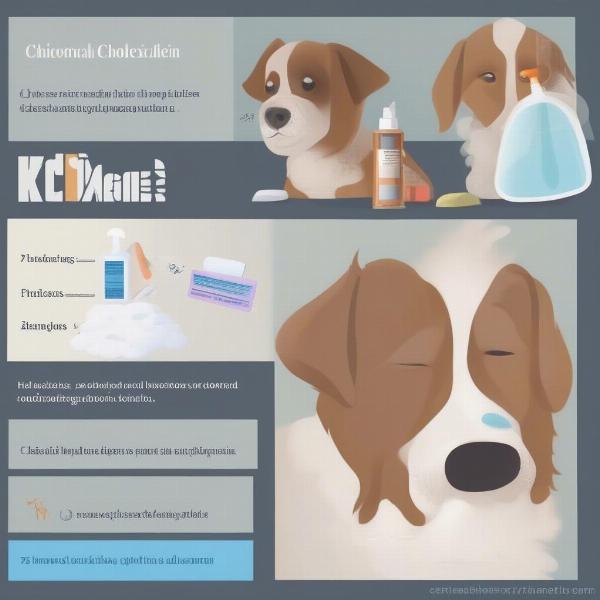Soliphen is a brand name often associated with antiseptic solutions containing chlorhexidine gluconate. While not specifically formulated for dogs, chlorhexidine-based products are commonly used in veterinary medicine for various purposes. This guide will explore the uses, benefits, and potential risks of using chlorhexidine products, like Soliphen, on dogs.
Understanding Chlorhexidine for Canine Use
Chlorhexidine is a broad-spectrum antiseptic effective against bacteria, fungi, and some viruses. It works by disrupting the cell membranes of microorganisms, leading to their death. In veterinary practices, chlorhexidine is often used for:
- Skin infections: Treating bacterial and fungal skin infections.
- Wound cleaning: Cleansing and disinfecting wounds, preventing infection.
- Surgical site preparation: Preparing the skin before surgery to reduce the risk of infection.
- Oral hygiene: Managing gum disease and controlling plaque buildup.
 Chlorhexidine Uses in Dogs
Chlorhexidine Uses in Dogs
While Soliphen itself may not be specifically marketed for veterinary use, many other chlorhexidine products are readily available for dogs. These products come in various forms, including:
- Shampoos and conditioners: For managing skin conditions.
- Solutions and sprays: For wound cleaning and disinfection.
- Oral rinses and gels: For dental hygiene.
Safe Use of Chlorhexidine on Dogs
When using any chlorhexidine product on your dog, it’s crucial to follow these safety guidelines:
- Veterinary consultation: Always consult your veterinarian before using any chlorhexidine product on your dog. They can determine the appropriate product, concentration, and usage frequency based on your dog’s specific needs.
- Follow instructions: Carefully follow the product label instructions. Using too much or too little can reduce efficacy or lead to adverse effects.
- Avoid ingestion: Chlorhexidine is meant for external use only. Prevent your dog from licking or ingesting the product.
- Monitor for reactions: Watch for any signs of allergic reaction or irritation, such as redness, swelling, or excessive itching. If these occur, discontinue use and contact your veterinarian.
Potential Risks and Side Effects
While generally safe, chlorhexidine can cause some side effects in dogs, such as:
- Skin irritation: Redness, dryness, or itching at the application site.
- Allergic reactions: Hives, facial swelling, or difficulty breathing.
- Ear irritation: If used in the ears, it can cause inflammation or pain.
- Eye irritation: Avoid contact with the eyes. If contact occurs, rinse thoroughly with water.
Choosing the Right Chlorhexidine Product
Choosing the right chlorhexidine product depends on the intended use. Discuss with your veterinarian to determine the appropriate concentration and formulation for your dog’s needs.
- For skin infections: Chlorhexidine shampoos or sprays are typically recommended.
- For wound cleaning: Chlorhexidine solutions are ideal.
- For oral hygiene: Chlorhexidine oral rinses or gels are available.
What if my dog licks chlorhexidine?
If your dog ingests a small amount of chlorhexidine, it’s unlikely to cause serious harm. However, larger amounts can cause gastrointestinal upset, such as vomiting and diarrhea. If you suspect your dog has ingested a significant amount of chlorhexidine, contact your veterinarian or a pet poison control center immediately.
Conclusion
Chlorhexidine products, while not always marketed under the name Soliphen, can be a valuable tool in managing various canine health issues. Always consult with your veterinarian before using any chlorhexidine product on your dog. They can guide you on proper usage, potential risks, and appropriate alternatives if needed. By following these guidelines, you can ensure the safe and effective use of chlorhexidine for your furry companion.
FAQ
- Is Soliphen safe for dogs? While Soliphen may not be specifically formulated for dogs, chlorhexidine-based products are generally safe when used as directed by a veterinarian.
- Can I use human chlorhexidine products on my dog? It’s best to use veterinary-approved chlorhexidine products on dogs. Human formulations may contain ingredients that are not safe for animals.
- How often can I use chlorhexidine on my dog? The frequency of use depends on the specific product and your dog’s condition. Follow your veterinarian’s instructions.
- What should I do if my dog experiences side effects from chlorhexidine? Discontinue use and contact your veterinarian immediately.
- Can chlorhexidine be used on puppies? Yes, but always consult your veterinarian for appropriate dosage and usage instructions for puppies.
- Can chlorhexidine be used long-term on dogs? Long-term use should be under the guidance of a veterinarian, as it can potentially disrupt the natural skin flora.
- Are there any natural alternatives to chlorhexidine for dogs? Some natural alternatives include honey, aloe vera, and chamomile. However, consult your vet before using any alternative treatments.
ILM Dog is your trusted source for comprehensive and practical dog care information. We provide expert advice on breed selection, health, training, nutrition, grooming, and more. From puppy care to senior dog care, we’re here to support you every step of the way. For personalized guidance and recommendations, contact us today! Email: [email protected] Phone: +44 20-3965-8624 Visit ILM Dog for more expert dog care advice.